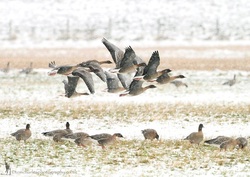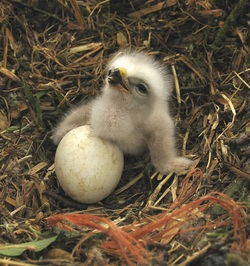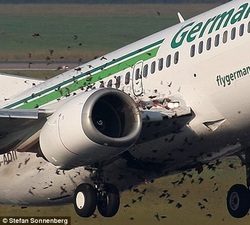 Lancashire's Pink-footed Geese under threat
Lancashire's Pink-footed Geese under threat The RSPB is issuing its first objections to fracking proposals over concerns that the controversial drilling technique will harm wildlife and the climate.
The charity has lodged a letter of objection with Lancashire County Council to a proposal by Cuadrilla at Singleton near Blackpool (Lancashire). The drilling site is close to an internationally important protected area for Pink-footed Geese and Whooper Swans, and could cause disturbance to the birds. The RSPB is also officially objecting to the contentious plans to explore for oil and gas at Balcombe (Sussex) on the grounds that no Environmental Impact Assessment has been carried out, and because increasing oil and gas use will scupper our chances of meeting climate targets.
Harry Huyton, RSPB head of climate and energy policy, said: "Balcombe has hit
the headlines as the battleground in the debate over fracking. The public there
are rightly concerned about the impact this new technology will have on their
countryside. These are not just nimbys worried about house prices — there is a
very real public disquiet about fracking. We have looked closely at the rules in
place to police drilling for shale gas and oil, and they are simply not robust
enough to ensure that our water, our landscapes and our wildlife are safe."
"Cuadrilla boss and former energy secretary Lord Howell claims that when he
made his much-publicised howler about fracking the 'desolate northeast', he
actually meant the northwest. Singleton in Lancashire is right in the heart of
the northwest and is on the doorstep of an area which is home to thousands of
geese and swans who will arrive from as far away as Siberia to roost and feed
next month and stay for the winter. There may not be as many local residents as
in Sussex, but this area is protected by European law because it is so valuable
for wildlife and Cuadrilla has done nothing to investigate what damage their
activities could do to it."
The RSPB has called on Lancashire County Council to ensure Cuadrilla has
carried out a full Environmental Impact Assessment before it goes ahead with any
work. The charity has also joined with other wildlife and environment groups to
call on the Government to rethink its shale gas policies.
Mr Huyton added: "Government figures show that in the north of England there
is potential for 5,000 sites and a total of up to 100,000 wells. The idea that
these will not have an impact on the countryside is very difficult to believe.
Fracking is technology largely untested in the UK and we really have no idea
what the impact will be on our wildlife. We do know, however, that concentrating
our resources on extracting fossil fuel from the ground instead of investing in
renewable energy threatens to undermine our commitment to avoiding dangerous
levels of climate change."
The charity has lodged a letter of objection with Lancashire County Council to a proposal by Cuadrilla at Singleton near Blackpool (Lancashire). The drilling site is close to an internationally important protected area for Pink-footed Geese and Whooper Swans, and could cause disturbance to the birds. The RSPB is also officially objecting to the contentious plans to explore for oil and gas at Balcombe (Sussex) on the grounds that no Environmental Impact Assessment has been carried out, and because increasing oil and gas use will scupper our chances of meeting climate targets.
Harry Huyton, RSPB head of climate and energy policy, said: "Balcombe has hit
the headlines as the battleground in the debate over fracking. The public there
are rightly concerned about the impact this new technology will have on their
countryside. These are not just nimbys worried about house prices — there is a
very real public disquiet about fracking. We have looked closely at the rules in
place to police drilling for shale gas and oil, and they are simply not robust
enough to ensure that our water, our landscapes and our wildlife are safe."
"Cuadrilla boss and former energy secretary Lord Howell claims that when he
made his much-publicised howler about fracking the 'desolate northeast', he
actually meant the northwest. Singleton in Lancashire is right in the heart of
the northwest and is on the doorstep of an area which is home to thousands of
geese and swans who will arrive from as far away as Siberia to roost and feed
next month and stay for the winter. There may not be as many local residents as
in Sussex, but this area is protected by European law because it is so valuable
for wildlife and Cuadrilla has done nothing to investigate what damage their
activities could do to it."
The RSPB has called on Lancashire County Council to ensure Cuadrilla has
carried out a full Environmental Impact Assessment before it goes ahead with any
work. The charity has also joined with other wildlife and environment groups to
call on the Government to rethink its shale gas policies.
Mr Huyton added: "Government figures show that in the north of England there
is potential for 5,000 sites and a total of up to 100,000 wells. The idea that
these will not have an impact on the countryside is very difficult to believe.
Fracking is technology largely untested in the UK and we really have no idea
what the impact will be on our wildlife. We do know, however, that concentrating
our resources on extracting fossil fuel from the ground instead of investing in
renewable energy threatens to undermine our commitment to avoiding dangerous
levels of climate change."


 RSS Feed
RSS Feed